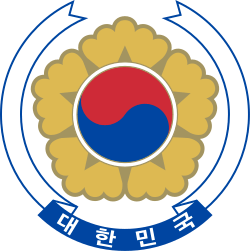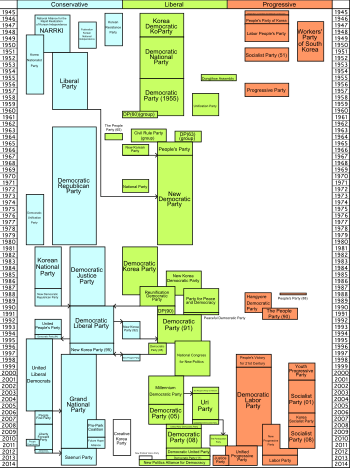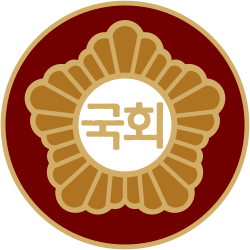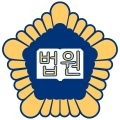List of political parties in South Korea
 |
|---|
| This article is part of a series on the politics and government of the Republic of Korea |
| Constitution |
|
Judiciary |
This article lists political parties in South Korea. South Korea has a weakly institutionalized multi-party system,[1][2] characterized by frequent changes in party arrangements. Political parties have a chance of gaining power alone.
Current parties
Main parties
In addition to 5 independents, seven political parties are present in the 20th National Assembly (forming a total of 300):
.png)
Extra-parliamentary parties
- Labor Party (노동당, Nodongdang)
- Christian Liberal Party (기독자유당; Gidok jayudang)
- Green Party Korea (녹색당, Noksaekdang)
- Hannara Party (한나라당, Hannaradang)
- People's Democratic Party (민중민주당, Minjungminjudang)
- People's New Party for Reform (개혁국민신당, Gaehyeok gukminsindang)
- Green Buddhist United Party (그린불교연합당, Geurin bulgyo yeonhapdang)
- International Green Party (국제녹색당, Gukje noksaekdang)
- Republican Party (공화당, Gonghwadang)
- Saenuri Party (2017) (새누리당, Saenuridang)
- United Korea Party
- Our Future (우리미래, Woori Mirae)
Defunct parties

Timeline of all mainstream political parties
Conservative parties
Mainstream parties
- National Alliance for the Rapid Realization of Korean Independence (1946-1951)
- Liberal Party (1951–1960)
- Democratic Republican Party (1963–1980)
- Democratic Justice Party (1981–1990)
- Democratic Liberal Party → New Korea Party (1990–1997)
Minor parties
- Korean Resistance Party (1945–1950)
- Federation Korean National Independence (1947-1951)
- Korea National Party (1947-1958)
- Democratic Unification Party (1973–1980)
- Korean National Party → New Democratic Republican Party (1981–1990)
- United People's Party → Democratic Party (1992-1995)
- United Liberal Democrats (1995–2006)
- People First Party (2005–2008)
- Liberty Forward Party → Advancement Unification Party (2008-2012)
- Pro-Park Coalition → Future Hope Alliance (2008-2012)
- Evergreen Korea Party (2017-2018)
- Grand National United Party (2017-2018)
Liberal parties
Mainstream parties
- Korea Democratic Party → Democratic National Party (1945-1955)
- Democratic Party (1955-1961)
- Civil Rule Party (1963-1965)
- People's Party → New Democratic Party (1965–1980)
- Democratic Korea Party (1981-1988)
- New Korea Democratic Party (1984–1988)
- Reunification Democratic Party (1987–1990)
- Peace Democratic Party (1987–1991)
- Democratic Party (1991–1995)
- National Congress for New Politics (1995-2000)
- Millennium Democratic Party → Democratic Party (2000–2008)
- The People's Party for Freedom → Uri Party (2002–2007)
- United New Democratic Party (2007–2008)
- United Democratic Party → Democratic Party (2008–2011)
- Democratic United Party → Democratic Party (2011–2014)
Minor parties
- Democratic Party (1963-1965)
- Democratic Party (1990–1991)
- Democratic Party (1995–1997)
- The Participation Party (2010-2011)
- New Political Vision Party (2014)
- Democratic Party (2014-2016)
Progressive parties
- Preparatory Committee for National Construction → People's Party of Korea → People's Labor Party (1945-1950)
- Workers' Party of South Korea (1946-1953)
- Socialist Party (1951-1953)
- Progressive Party (1956-1958)
- United Socialist Party of Korea (1961 ~ 1967)
- Hangyore Democratic Party (1988-1991)
- People's Party (1988)
- The People's Party (1990-1992)
- People's Victory 21 → Democratic Labor Party (1997-2011)
- Youth Progressive Party → Socialist Party → Korea Socialist Party → Socialist Party (1998–2012)
- New Progressive Party (2008–2012)
- People's United Party (South Korea) (2016–2017)
- New People's Party (South Korea) (2017)
Green parties
- Korea Greens (2004-2008)
Banned parties
- Progressive Party (1956-1958)
- Anti-Imperialist National Democratic Front (1969-1985)
- National Democratic Front of South Korea (1985-2005)
- Unified Progressive Party[20] (2011-2014)
See also
References
- ↑ Wong, Joseph (2015). "South Korea's Weakly Institutionalized Party System". Party System Institutionalization in Asia: Democracies, Autocracies, and the Shadows of the Past. Cambridge University Press. pp. 260–279.
- ↑ Wong, Joseph (2012). "Transitioning from a dominant party system to multi-party system: The case of South Korea". Friend or Foe? Dominant Party Systems in Southern Africa: Insights from the Developing World. United Nations University Press. pp. 68–84.
- ↑ Limited, Bangkok Post Public Company. "Can Moon's J-nomics save South Korea's economy?".
- ↑ http://www.koreaherald.com/view.php?ud=20170530000666
- ↑ Cronin, Patrick M. (2009), Global Strategic Assessment 2009: America's Security Role in a Changing World, INSS, archived from the original on 28 January 2018
- ↑ Global Security: Japan and Korea; Tenth Report of Session 2007-08, House of Commons of the United Kingdom, 2008, archived from the original on 28 January 2018
- ↑ Manyin, Mark E. (2003), South Korean Politics and Rising "Anti-Americanism": Implications for U.S. Policy Toward North Korea (PDF), Congressional Research Service
- ↑ The Economist, print edition, 11 April 2008, South Korea's election: A narrow victory for the business-friendly centre-right, Accessed 19 October 2013.
- ↑ Klassen, Thomas R. (2013), Korea's Retirement Predicament: The Ageing Tiger, Routledge, p. 12
- ↑ Tactical nuclear missiles mooted by South Korean opposition. The Irish Times. Author - Peter Murtagh. Published August 16, 2017. Retrieved August 3, 2018.
- ↑ South Korea conservatives planning boycott over North Korea. United Press International. Author - Elizabeth Shim. Published 7 February 2018. Retrieved 13 June 2018.
- ↑ South Koreans set to continue backing President Moon’s agenda in local elections. Foreign Brief. Published 13 June 2018. Retrieved 13 June 2018.
- ↑ Smith, Cindy J.; Zhang, Sheldon X.; Barberet, Rosemary, eds. (May 3, 2011). Routledge Handbook of Criminology. Routledge. p. 443. ISBN 9781135193850. Archived from the original on January 28, 2018. Retrieved May 16, 2017.
- ↑ "민주평화당發 '민평-정의 공동교섭단체론'…순항할까". Naver. Retrieved 14 June 2018.
- ↑ "Minor opposition party picks Rep. Shim Sang-jung as new chief". Yonhap News. 2015-07-18. Retrieved 2017-01-02.
- ↑ "Moon Jae-in's support rises 40%, while Ahn Cheol-soo's falls to 24%". Hankyoreh. Retrieved 2 May 2017.
- ↑ Kim Jong Un's Olympics? South Koreans Burn Dictator's Effigy During North Korea's Delegation Visit. Newsweek. Author - Sofia Lotto Persio. Published 22 January 2018. Retrieved 13 June 2018.
- ↑ "Kim Jong-un's picture burned in protest against North Korea's Olympic participation". The Korea Times. 22 January 2018. Retrieved 28 January 2018.
- ↑ Rashid, Raphael (26 January 2018). "Pyongyang Olympics? Burning Tensions Ahead of Games". KOREA EXPOSÉ.
- ↑ Yonhap News Agency, December 19, 2014, , “...South Korea's Constitutional Court on Friday ordered the dissolution of a pro-North Korean minor opposition party...”
Bibliography
- The present state of registered political parties, National Election Commission of S. Korea.
- The present state of political parties registration, National Election Commission of S. Korea, May 29, 2008.
This article is issued from
Wikipedia.
The text is licensed under Creative Commons - Attribution - Sharealike.
Additional terms may apply for the media files.


